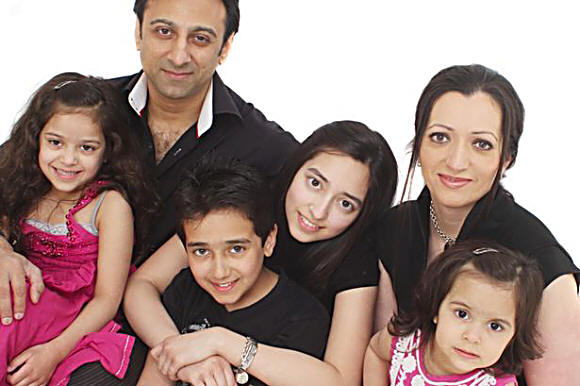|

Tasmina and family
The Internet has opened
up a vast resource of information to all of us, one that shifts and
changes literally by the second. We have instant news, 24 hours a day,
wherever we are; we can check ahead if a flight looks likely to be
delayed; we can know in advance if there’s a traffic problem on the way
to work.
That, of course, is just
the tip of the iceberg. Underneath, you can find out information on
everything from the ancient Romans to how to build your own home. Kids
can get the answers to homework questions and some, unsurprisingly, can
just buy or copy their essays.
Cyberspace, for all its
value, can be a very nasty place. Perhaps it is inevitable that
alongside freedom of speech and the open resources the Web provides,
there will always be those who seek to abuse.
Pornographers are the
most obvious and potent. In 2009, Lothian and Borders Police managed to
catch a particular group of men.
This ring of eight
paedophiles was convicted of child abuse and producing indecent images
of children. They were found guilty of more than 50 charges, ranging
from abusing infants from three months old to conspiracy, and holding
more than 125,000 images of child pornography.
Email and photographs are
easy tools for people like this. Children are vulnerable to the kind of
friendly overtures such criminals make.
And it isn’t only
pornography that is attacking people online. At least 10,000 people were
victims of human trafficking in the EU in 2010. The actual figure is
probably much larger. These criminal activities are also carried out
through Internet communications.
Older, so-called ‘silver
surfers’, have become vulnerable to various financial rip-offs online.
Others have literally opened their doors to burglars as a result of
earlier email contact.
Social media is a
lifeline for some and a tool for exploitation to others.
I try to protect my own
children. Their access to online information is carefully controlled in
our house but I recognise that we need stronger and even more effective
weapons, if we are to really keep them safe.
And that’s where the EU
comes in.
Granted, there is only so
much legislation can do, but if you operate the same laws across 27
countries and 504 million people, then that can really increase its
effective leverage. There is nowhere to run. The European Arrest Warrant
that David Cameron wants to get rid of means that member countries will
automatically return the accused to the country in which the crime was
allegedly committed.
For children, the EU has
recognised the importance of giving them the digital skills and tools
they need to benefit fully and safely from the digital world. A year
ago, the Commission set out its plans to achieve that.
European Commissioner for
Home Affairs, Cecilia Malmström, said last May: ''We are living in the
digital age and the younger generations are those most active online.
These young people are particularly at ease with the use of the internet
but they are still vulnerable to online threats. It is our duty as
parents to keep our children safe – and this includes on the Web. We
have to reinforce cooperation at European and international levels to
combat cybercrime, and especially the most horrible acts such as sexual
exploitation and the dissemination of child sexual abuse material
online".
The Internet wasn’t
created for children but they are using it more and more and from an
earlier age. Alongside all of the vast opportunities for business and
education, we need to protect our children from abuse online just as we
do on the street.
Ultimately, it’s up to us
as parents to make sure we have the controls in place, but it’s
reassuring to know that the European Commission is aware of the issues
and seeking to act. This is an extract from ‘The Digital Agenda for
Europe’:
“Young people and
children are the most active group using the Internet today: 73 % of
people aged 16 to 24 regularly use advanced services to create and share
online content, twice the EU average (35 %). 66% of all Europeans under
24 use the Internet every day, compared to the EU average of 43 %.
However, although these young people may feel totally at home online,
they are still vulnerable to online threats.
“The Digital Agenda will
help parents and their children keep safe online. In particular, through
the Safer Internet programme, all EU countries will be encouraged to set
up hotlines for reporting offensive online content and offer teaching
online safety in schools. Providers of the online services that are most
popular among the younger generations (e.g. social networks, mobile
phone operators) will be asked to further develop self-regulatory
measures regarding online safety for children by 2013.
“Finally, the Digital
Agenda proposes to reinforce cooperation at European and International
levels to combat cybercrime (e.g. alert platforms online at national and
EU levels to tackle sexual exploitation and dissemination of child
sexual abuse material online) and other forms of cyber attacks, identity
theft and spam.”
I want to be there to
contribute to Europe getting this right. |

